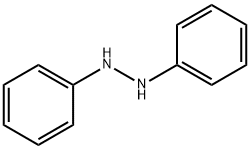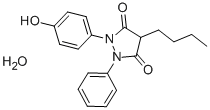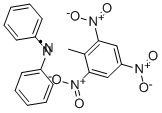Hydrazobenzene , >98.0%(HPLC) , 122-66-7
Synonym(s):
N,N′-Diphenylhydrazine;N,N′-Bianiline;Hydrazobenzene;NSC 3510
CAS NO.:122-66-7
Empirical Formula: C12H12N2
Molecular Weight: 184.24
MDL number: MFCD00003012
EINECS: 204-563-5
PRODUCT Properties
| Melting point: | 123-126 °C(lit.) |
| Boiling point: | 308.2°C (rough estimate) |
| Density | 1,158 g/cm3 |
| vapor pressure | 2.6 x 10-5 mmHg at 25 °C (Mabey et al., 1982) |
| refractive index | 1.6266 (estimate) |
| storage temp. | Refrigerator |
| solubility | Soluble in ethanol (Weast, 1986). |
| pka | 3.02±0.70(Predicted) |
| form | solid |
| color | Colorless to pale yellow to orange crystals |
| Water Solubility | 221 mg/L at 25 °C (U.S. EPA, 1980a) |
| BRN | 639793 |
| Stability: | Stable. Incompatible with strong oxidizing agents, strong acids. |
| InChIKey | YBQZXXMEJHZYMB-UHFFFAOYSA-N |
| CAS DataBase Reference | 122-66-7(CAS DataBase Reference) |
| NIST Chemistry Reference | Hydrazine, 1,2-diphenyl-(122-66-7) |
| EPA Substance Registry System | 1,2-Diphenylhydrazine (122-66-7) |
Description and Uses
Diphenylhydrazine is a man-made chemical that occurs in two isomeric forms: 1,1-diphenylhydrazine and 1,2-diphenylhdrazine. Diphenylhydrazine is produced by the reduction of nitrobenzene. Little or no information is available for 1,1-diphenylhydrazine. Most toxicological and use data pertain to 1,2-diphenylhydrazine.
Previously, 1,2-diphenylhydrazine was used for producing benzidine that was used in the synthesis of benzidine-based dyes. However, these dyes are no longer produced in the United States. The primary use of 1,2-diphenylhydrazine is in the production of the anti-inflammatory agent phenylbutazone and sulfinpyrazone, a uricosuric agent.
Safety
| Symbol(GHS) |    GHS07,GHS08,GHS09 |
| Signal word | Danger |
| Hazard statements | H302-H350-H410 |
| Precautionary statements | P201-P273-P301+P312+P330-P308+P313 |
| Hazard Codes | T,N |
| Risk Statements | 45-22-50/53 |
| Safety Statements | 53-45-60-61 |
| RIDADR | UN 3077 9/PG 3 |
| WGK Germany | 3 |
| RTECS | MW2625000 |
| F | 10-23 |
| TSCA | Yes |
| HazardClass | 6.1 |
| PackingGroup | III |
| HS Code | 29280000 |
| Hazardous Substances Data | 122-66-7(Hazardous Substances Data) |
| Toxicity | Acute oral LD50 for rats 301 mg/kg (quoted, RTECS, 1985). |





